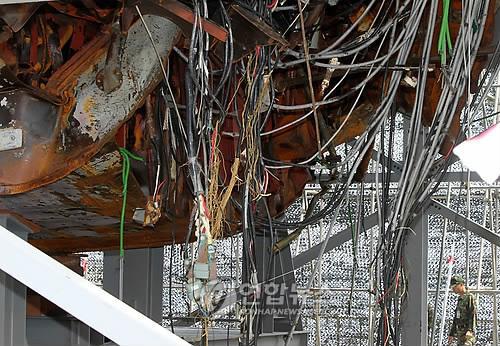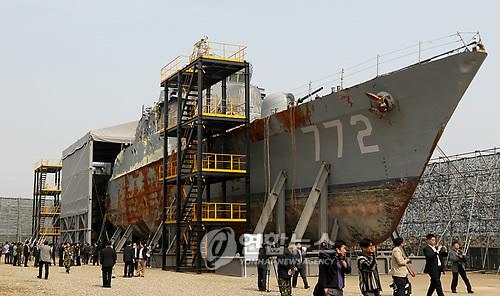Official Reaction on the Cheonan
The official reactions to the findings of the investigation into the sinking of the Cheonan continue. An executive summary of the official, international investigation can be read here. Yonhap provides a chronology of related events. Daily NK published a selection of the investigation’s images, distributed to reporters at the press conference announcing the findings.
The DPRK National Defense Commission’s statement says, in part:
We would like to question them so busy linking the above-said case with the DPRK why they don’t link with it the death of a puppet army soldier, crashes of fighter plane and gunship of the puppet navy and air force and the sinking of a civilian fishing boat that occurred one after another almost simultaneously.
It is the age of science and technology.
As a swollen balloon is bound to break, any lie is bound to be brought to light no matter how hard one may try to make it sound plausible.
What is evident is that the sinking of warship “Cheonan” can never be construed otherwise than a “conspiratorial farce” and “charade” orchestrated by the group of traitors in a deliberate and brigandish manner to achieve certain political and military aims because only 46 soldiers met miserable deaths while officers survived the case.
This being a hard reality, they are pointing a dirty accusing finger at us like a thief crying “Stop the thief!”
It is a trite method of the successive south Korean puppet regimes to fake up a shocking case and use it for floating a story about “north wind” whenever they find themselves in a crisis.
The statement announces that the NDC will send its own inspection group. ITAR-TASS reports:
In the light of this, the statement points out, the NDC has decided “to send its own inspection commission to the ship sinking area in order to verify proofs that allegedly evidence the DPRK’s involvement in the incident”.
Besides, the NDC official warned that “the country’s people and army will react to various kinds of ‘sanctions’ and ‘punishments’ by taking tough measures, including military actions”. The NDC official also thinks that in the current situation the US and Japan “ought to show discretion and caution”.
Chosun Ilbo writes on Chinese media silence the day before the investigation’s findings were announced. Xinhua’s English service reports that China “hopes that all parties continue to show restraint”:
China on Thursday says it has noted the investigation results released by the Republic of Korea (ROK) over the sinking of a ROK warship, calling on all parties to exercise calmness and restraint over relevant issues of the sinking.
Foreign Ministry spokesman Ma Zhaoxu made the remarks at a regular press briefing when responding to questions.
He said China upheld that all parties should exercise calmness and restraint, properly deal with relevant issues, and avoid escalation of the situation.
After the sinking of the ship, China expressed condolences and sympathy to the ROK on many occasions for their casualties, which fully embodied China’s understanding of the grief of the ROK government and people.
Ma said China has always viewed and dealt with international and regional affairs in a fair and objective manner.
The United States described the DPRK’s “provocations as unacceptable.” White House Press Secretary Robert Gibbs:
“North Korea must understand that belligerence towards its neighbors and defiance of the international community are signs of weakness, not strength. Such unacceptable behavior only deepens North Korea’s isolation. It reinforces the resolve of its neighbors to intensify their cooperation to safeguard peace and stability in the region against all provocations.”
Chang Jae-soon reports on the Lee Administration’s policy options, now that the official investigation has concluded:
Analysts agree that a retaliatory military strike is not a viable option because it could escalate into a full-scale war or hurt the country’s fast-recovering economy. South Korea also doesn’t want to disrupt the G-20 summit scheduled for November in Seoul, they say.
Other military or diplomatic options would be hardly more than symbolic steps with little teeth, such as orchestrating a shower of international opprobrium on Pyongyang, or staging a show of force aimed at warning against a similar provocation, experts said.
“That’s the dilemma South Korea faces,” said Cha Du-hyeon, a senior security expert at the Korea Institute for Defense Analyses in Seoul, referring to the lack of effective options that South Korea can take to make North Korea pay a heavy price for its actions.
One of the most likely diplomatic options is taking the case to the U.N. Security Council. South Korea has already launched a diplomacy campaign to rally international support for a Council referral, providing closed-door briefings to envoys from about 30 nations on the probe’s outcome even before it was formally announced.
But prospects are dim for getting the Council to adopt fresh sanctions or even toughen existing ones against the North because China — the North’s last-remaining major ally and permanent Council member with veto powers — could oppose such a move.

The Cheonan, the South Korean warship that sank on March 26 near the border with North Korea, is revealed to the media at the Navy's 2nd Fleet headquarters in Pyeongtaek on May 19. Yonhap
South Korean legislative leaders agreed to form their own joint enquiry, despite the GNP and DP having disparate reactions to the investigation and the sinking, in general:
“The National Assembly has to adopt a resolution against North Korea as quickly as possible, displaying the (South) Korean people’s stern and unified stance (against the North),” Assembly Speaker Kim Hyong-o said in a statement.
The parliamentary leader then urged the political parties not to attempt to capitalize on the tragic Cheonan incident, particularly ahead of the local elections.
The GNP vowed strong retaliations against North Korea, urging opposition parties to join its anti-Pyongyang resolution in the parliament.
“Now that North Korea’s role has become evident, our nation should become one,” GNP chairman Chung Mong-joon said in a party meeting.
A day earlier, the conservative ruling party submitted to the National Assembly foreign affairs committee a punitive resolution demanding further suspension of cross-border economic projects and international coordination against North Korea.
“Any division in our nation would only benefit the criminals who attacked us,” GNP secretary general Choung Byoung-gug said.
On the contrary, opposition parties attacked the government over its ability to keep the nation safe. Calls for the resignation of the entire Cabinet came from the DP and the third-largest Liberty Forward Party (LFP).
Sunny Lee provides a good catch-all of analysts in The National:
Although Seoul publicly vowed retaliation, and South Korea’s conservative media outlets are clamouring for revenge, Cha Du-hyeogn, the director of North Korean studies at the state-run Korea Institute for Defence Analyses in Seoul, said South Korea would likely shy away from an actual military response.
Paik Hak-soon, a security analyst at the Sejong Institute, a think tank in Seoul, agreed: “Military options are possible in rhetoric, but not in reality.”Analysts outside South Korea assessed the situation a bit differently.
“In the past, announcements like this were frequently followed by missile tests, expanded military exercises, refusal to participate in international negotiations and/or continued threats,” said Joseph Bermudez, a military analyst for Jane’s Intelligence Review and author of The Armed Forces of North Korea.
“This presents a situation where the responses by all sides could lead to unintended consequences,” Mr Bermudez said.
North Korea offered to dispatch an inspection team to the South to “verify” the South’s evidence. The local JoongAng Ilbo newspaper said the South government was put in a dilemma whether to accept the North’s surprise proposal.
“It clearly shows that North Korea didn’t do it,” said Cui Zhiying, the director of the Korean Peninsula Research Centre at Tongji University in Shanghai.
Mr Cha refuted that view, saying the North’s gesture was to woo China and Russia, two Cold War allies of North Korea, to its side.Some analysts fear the possibility of formation of two opposing wings of ideological blocs, with China, North Korea and Russia on one side and South Korea, the US and Japan on the other.
“I wouldn’t say it’s the start of a new Cold War. But the current situation adds instability in the East Asia,” said Mr Paik, the analyst in Seoul.
Mr Jiang agreed: “I am not optimistic. We are entering a phase of new crisis. South Korea wants justice. But North Korea has never been known as backing down.”
He expects China’s response on the matter will be muted. “I would be very surprised if Beijing would come out and say, ‘Yes, we’re going to join the international community in condemning North Korea’.”
And JoongAng Ilbo, citing an anonymous diplorep source, reports that the sinking of the Cheonan prevented US-DPRK interactions:
The United States and North Korea had agreed to hold bilateral talks to help restart six-party denuclearization discussions in March, but the sinking of the South Korean warship Cheonan on March 26 derailed the plan, a diplomatic source said yesterday.
The source also said the U.S. was planning to issue a U.S. visa to Kim Gye-gwan, the chief nuclear negotiator for North Korea, until the Cheonan incident occurred.
According to the source, North Korea in March told the United States that a bilateral Washington-Pyongyang meeting would pave the way to the resumption of the six-party talks, which were last held in December 2008. Previously, the North had demanded as preconditions the lifting of economic sanctions and the signing of a peace treaty to replace the armistice that ended the Korean War in 1953.
